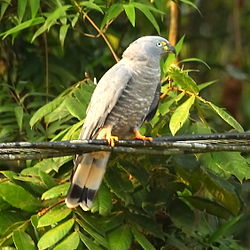| Chondrohierax | |
|---|---|
 | |
| Hook-billed kite (Chondrohierax uncinatus) | |
| Scientific classification | |
| Kingdom: | Animalia |
| Phylum: | Chordata |
| Class: | Aves |
| Order: | Accipitriformes |
| Family: | Accipitridae |
| Subfamily: | Perninae |
| Genus: | Chondrohierax Lesson, 1843 |
| Type species | |
| Daedalion erythrofrons [1] Lesson, 1843 | |
| Species | |
C. uncinatus | |
Chondrohierax is a genus of birds of prey in the family Accipitridae, with two species. The hook-billed kite is widespread in the warmer parts of the Americas, while the Cuban kite is a critically endangered Cuban endemic that is rarely seen.


